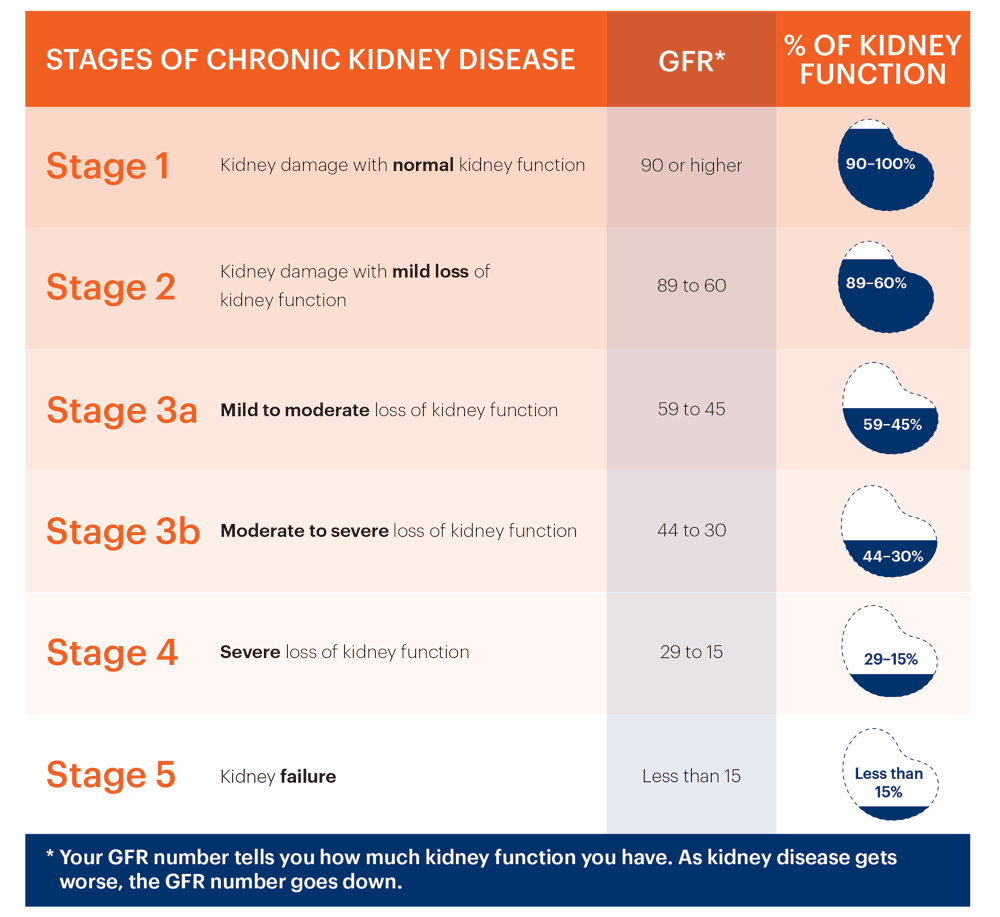What is the eGFR?
The estimated glomerular filtration rate (eGFR) is a test that measures your level of kidney function and determines your stage of kidney disease. Your healthcare team can calculate it from the results of your blood creatinine test, your age, body size, and gender. If your eGFR number is low, your kidneys may not be working as well as they should. People with a lower eGFR are at increased risk of having chronic kidney disease (CKD) progress to kidney failure. The sooner that kidney disease is found, the better the chance of slowing or stopping it from getting worse.
What does an eGFR test result mean?
- An eGFR below 60 for three months or more, or an eGFR above 60 with kidney damage (marked by high levels of albumin in your urine) means chronic kidney disease. Your healthcare team will want to find the cause of your kidney disease and continue to check your kidney function to help plan your treatment.
- Please note that the eGFR normally declines with age. A low eGFR in an older person does not always mean CKD, even if the eGFR is less than 60.
- When you get an eGFR test, a simple urine test called the uACR will also be done to check for blood or albumin (a type of protein) in the urine. When you have albumin in your urine it is called albuminuria. Blood or protein in the urine can be an early sign of kidney disease.
Based on your eGFR and UACR, your healthcare team may also do one or more of these tests:
- Imaging, such as an ultrasound or CT scan to get a picture of your kidneys and urinary tract. This tells your healthcare team whether your kidneys are too large or too small, whether you have a problem like a kidney stone or tumor, and whether there are any problems in the structure of your kidneys and urinary tract.
- A kidney biopsy, which is done in some cases to check for a specific type of kidney disease. This test shows the type and amount of kidney damage there is, which helps with planning treatment. To do a biopsy, the doctor removes small pieces of kidney with a needle and looks at them under a microscope.
Your healthcare team may also ask you to see a kidney doctor, called a nephrologist, who will consult on your case and help manage your care.
What can you do to protect your kidney function?
- Get your kidneys checked at least every year. Your healthcare team will do a simple blood test to find out your eGFR. They will also do a urine albumin-to-creatinine ratio (UACR), which shows if you have protein (albumin) in the urine. Protein in the urine may mean you have kidney damage.
- Control blood pressure if you have high blood pressure.
- Control blood sugar if you have diabetes.
- In general, if you have CKD, avoid non-steroidal anti-inflammatory drugs (NSAIDs) such as ibuprofen and naproxen.
- If you have CKD, tell your healthcare team before having any test that uses contrast dye.
- Do not smoke.
- Exercise and follow a healthy diet that's low in sodium, saturated fat, and sugar, but high in fresh fruits, vegetables, whole grains, lean meats, fish, and poultry. Avoid highly processed foods.
- Stay at a healthy weight. Lose weight if your healthcare team says that you should.
- Discuss any vitamins, minerals, herbs, weight loss or body building supplements with your healthcare team before taking them. Many of these products can hurt your kidneys.
- Make sure that any drugs you take are the right dose for your age and your level of kidney function. You should discuss this with your healthcare team.
For more information:
- Speak with your healthcare team
- Visit the National Kidney Foundation at www.kidney.org
